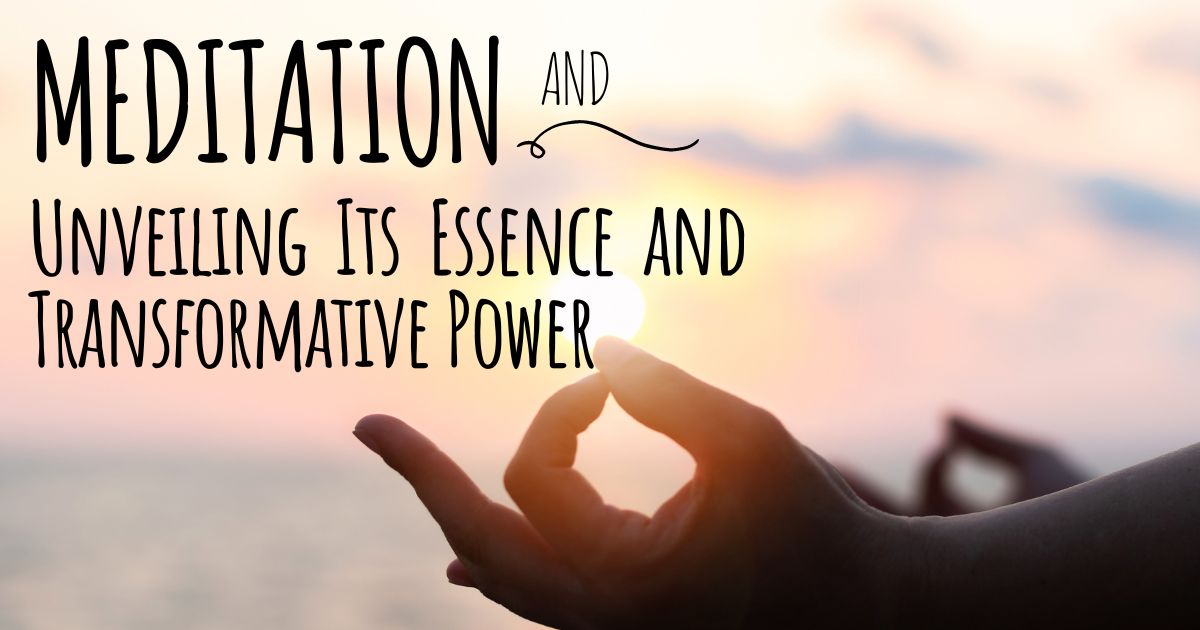Introduction to Meditation: A Timeless Journey to Inner Peace
Meditation, a practice as ancient as civilization itself, continues to be a beacon of tranquility and self-awareness in our fast-paced modern world. Rooted in the profound depths of human history, this art of internal focus and serenity transcends cultures, continents, and epochs, embodying a universal quest for inner peace and understanding.
In its essence, meditation is the deliberate practice of focusing the mind, cultivating awareness, and fostering an emotionally calm state. It’s a journey inward, a pause from the external noise, allowing individuals to explore the vast landscapes of their inner world. This practice has morphed and evolved through time, adorning different cultural cloaks, yet its core—achieving a state of mental clarity and emotional stability—remains steadfast.
Historically, the seeds of it were sown in the fertile grounds of ancient civilizations. The earliest records, found in the scriptures of Hinduism, depict meditation as an integral element of spiritual life. Not just confined to the East, traces of meditative practices were also evident in the early Christian, Jewish, and Islamic traditions, each adapting the practice to its unique spiritual narrative.
The Interplay of Meditation in Various Traditions: A Cultural Symphony
As it meandered through various cultures, it donned diverse forms, each resonating with the spiritual ethos of its people. In Hinduism it is called ‘dhyana,’ and served as a conduit to understanding the eternal self, while in Buddhism, it became the pathway to enlightenment and liberation from suffering. The Sufi traditions of Islam embraced meditation as a means to deepen one’s love and connection with the Divine.
Moreover, tapestry of meditation is rich and varied, with each tradition contributing a unique thread to its grandeur. In Jainism, it is a tool for attaining knowledge and liberation, while in Taoism, it’s a method to harmonize with the Tao, the fundamental nature of the universe. Even in the secular realm, it has found a place as a technique for stress reduction, emotional regulation, and enhanced well-being.
The transformative power of it in holistic health cannot be overstated. By integrating the mind, body, and spirit, meditation offers a comprehensive approach to health and well-being. It’s not merely about alleviating physical symptoms but about fostering a state of complete harmony and balance.
The Science of Meditation: Demystifying Its Benefits
The benefits of meditation are not just anecdotal; they are increasingly being validated by science. Research reveals that it can significantly reduce stress, anxiety, and depression, enhancing overall psychological well-being. It improves attention, memory, and the ability to process information, reflecting the profound impact of it on the brain.
Neuroscientific studies show that it can lead to changes in brain structure and function, particularly in areas related to attention, emotional regulation, and self-awareness. These findings underscore it’s role in promoting a healthy mind, an essential component of holistic health.
The journey through meditation unveils a myriad of benefits that harmonize our mental, physical, and spiritual well-being. Scientific inquiry into this ancient practice has illuminated its profound impact, making it an essential component of holistic health paradigms.
- Neurological and Psychological Effects
- Meditation fosters significant improvements in attention, reducing the susceptibility to distractions and enhancing the ability to focus.
- Emotional regulation is another key benefit, with meditation aiding in the management of emotions, thereby promoting mental tranquility.
- Studies have illustrated that consistent meditation practice leads to structural brain changes, particularly in areas associated with cognitive processing and emotional control.
- Meditation Techniques and Their Benefits
- Various techniques such as Mindfulness-Based Stress Reduction (MBSR) and Vipassana offer paths to cultivate self-awareness and inner peace.
- Techniques like Zen meditation provide tools for practitioners to delve into deeper states of awareness and clarity.
- Practices such as Transcendental Meditation (TM) facilitate a unique state of restful alertness, which can significantly reduce stress and anxiety levels.
- Healthcare and Meditation
- In pain management, meditation has shown efficacy in reducing the perception of pain and improving patients’ quality of life.
- Mental health benefits are profound, with meditation aiding in the alleviation of symptoms associated with anxiety and depression.
- From a holistic perspective, meditation contributes to overall well-being, enhancing one’s ability to maintain balance amidst life’s challenges.
Frequently Asked Questions (FAQs)
- What is the best time of day to meditate for optimal benefits?
- While it is beneficial at any time, many find morning meditation sets a positive tone for the day. However, the best time is one that fits consistently into your daily schedule.
- Can it help with anxiety?
- Yes, numerous studies have demonstrated that meditation can significantly reduce the symptoms of anxiety, helping individuals cultivate a sense of calm and presence.
- How long should I meditate each day?
- Even a few minutes of daily meditation can be beneficial. Start with short sessions and gradually increase the duration as you become more comfortable with the practice.
- Do I need a special place to meditate?
- While a quiet, dedicated space can enhance the experience, you can meditate anywhere you can sit quietly and without interruption.
- Is meditation tied to any specific religion?
- While it has roots in various religious and spiritual traditions, the practice itself can be secular and is accessible to people of all backgrounds and beliefs.
- How can I know if I’m meditating correctly?
- The essence of meditation lies in the practice itself. Being present, aware, and focused during your session indicates you’re on the right path. Over time, you will likely notice the calming effects and other benefits in your daily life.
